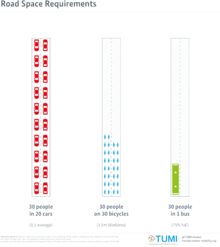
The externalities of automobiles, similar to other economic externalities, represent the measurable costs imposed on those who do not own the vehicle, in contrast to the costs borne by the vehicle owner. These externalities include factors such as air pollution, noise, traffic congestion, and road maintenance costs, which affect the broader community and environment. Additionally, these externalities contribute to social injustice, as disadvantaged communities often bear a disproportionate share of these negative impacts.[1] According to Harvard University,[2] the main externalities of driving are local and global pollution, oil dependence, traffic congestion and traffic collisions; while according to a meta-study conducted by the Delft University[3] these externalities are congestion and scarcity costs, accident costs, air pollution costs, noise costs, climate change costs, costs for nature and landscape, costs for water pollution, costs for soil pollution and costs of energy dependency.[4]
- ^ Hosseini, Keyvan; Stefaniec, Agnieszka (2023). "A wolf in sheep's clothing: Exposing the structural violence of private electric automobility". Energy Research & Social Science. 99: 103052. Bibcode:2023ERSS...9903052H. doi:10.1016/j.erss.2023.103052. hdl:2262/102321. ISSN 2214-6296.
- ^ IAN W. H. PARRY; et al. (June 2007). "Automobile Externalities and Policies" (PDF). Journal of Economic Literature: 30. Retrieved 2015-09-20.
- ^
M. Maibach; et al. (February 2008). "Handbook on estimation of external costs in the transport sector" (PDF). Delft, February: 332. Retrieved 2015-09-20.
{{cite journal}}: Cite journal requires|journal=(help) - ^ Miner, Patrick; Smith, Barbara M.; Jani, Anant; McNeill, Geraldine; Gathorne-Hardy, Alfred (1 February 2024). "Car harm: A global review of automobility's harm to people and the environment". Journal of Transport Geography. 115: 103817. Bibcode:2024JTGeo.11503817M. doi:10.1016/j.jtrangeo.2024.103817. hdl:20.500.11820/a251f0b3-69e4-4b46-b424-4b3abea30b64.